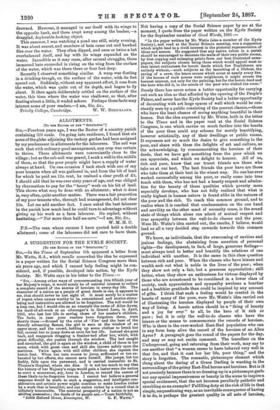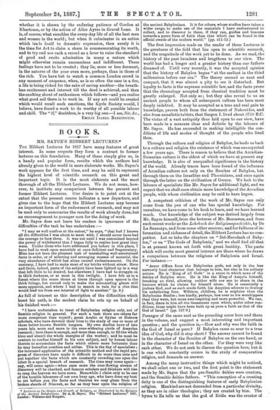A SUGGESTION FOR THE KYRLE SOCIETY.
[TO TEM Bones Olt TECH SPIICTATOB."] SI11,—In the Times of September 5th appeared a letter from Mr. Watts, R.A., which recalls somewhat the idea he expressed in a paper written for the Social Science Congress more than SIX years ago, and which I cannot help feeling might be con- sidered, and, if possible, developed into action, by the Kyrle Society. Mr. Watts says in his letter to the Times SIE,—Among other ways of commemorating this fiftieth year of her Majesty's reign, it would surely be of national interest to collect a complete record of the stories of heroism in every-day life. The character of a nation as a people of great deeds is one, it appears to see, that should never be lost sight of. It mast surely be a matter of regret when names worthy to be remembered and stories stimu- lating and instructive are allowed to be forgotten. The roll would be a long one, bat I would cite as an example the name of Alice Ayres, the maid-of.all-work at en oilmonger's in Gravel Lane, in April, 1885, who lost her life in saving those of her master's children. The facto, in case your readers have forgotten them, were shortly these L.—Reseed by the cries of 'Fire' and the heat of the fiercely advancing flames, the girl is seen at the window of an upper story, and the crowd, holding np some clothes to break her fall, entreat her to jump down at once for her life. Instead she goes back, and reappears dragging a feather-bed after her, which, with great difficnity, she pushes through the window. The bed caught and atretched, the girl is again at the window, a child of three in her arms, which with great care and skill she throws safely upon the mattress. Twice again with still older children she repeats the heroic feat. When her turn comes to jump, suffocated or too ex- hausted by her efforts, she cannot save herself. She jumps, bat too feebly, falls upon the pavement, and is carried insensible to St. Thomas's Hospital, where she dies. It is not too much to say that the history of her Majesty's reign would gain a lustre were the nation to erect a monument, say, here in London, to record the names of these likely-to-be-forgotten heroes. I cannot but believe a general response would be made to such a suggestion, and intelligent con- sideration and artistic power might combine to make London richer by a work that is beautiful, and oar nation richer by a record that is infinitely honourable. The material prosperity of a nation is not an abiding possession ; the deeds of its people are.—Yours faithfully, Not having a copy of the Social Science paper by me at the moment, I quote from the paper written on the Kyrle Society for the September number of Good Words, 1881:— " In the paper written by Mr. Watts (also a member of the Kyrle Society), and read at the Social Science meeting, was a suggestion which might lead to a vivid interest in the pictorial representation of ideas and scenes. He suggested that any native talent in a parish should be encouraged to decorate the walla of their own pnblio rooms, by first copying and enlarging prints from our best illustrated news- papers, the subjects chosen being those which would appeal most to that latent enthusiasm for heroic, deeds which few Englishmen are entirely without,—such subjects as the launching of a lifeboat, the saving of a crew, the brave scenes which occur at nearly every fire. If the heroes of ouch scenes were neighbours, it might arouse the keenest interest, not only for the painting, but for the heroic deed and the hero who did it, in the minds of the poor who visited the room."
Surely there has never arisen a better opportunity for carrying, out such an idea as that afforded by the opening of the People's Palace, and never has the Kyrle Society had a better opportunity of decorating with art large spaces of wall which would be con- stantly seen by a public consisting of the poorest classes,—those who have the least chance of seeing anything beautiful in their homes. But the idea expressed by Mr. Watts. both in the letter to the Times and in the paper read at the Social Science Congress, is one which carries us much further into the hearts of the poor than could any scheme for merely beautifying, however artistically, any of their dwellings or public rooms. It expresses not so much the desire to give something to the poor, and share with them the delights of art and culture, as the acknowledging, by commemorating the heroism of their deeds, that we have got something from the poor which we can appreciate, and which we delight to honour. All of us, rich and poor, know that our truest friends are those who take us at our best. The best friends the poor have are those who take them at their best in the wisest way. No one has ever worked successfully among the poor, or really come into true touch with them, who has not had a hearty respect and admira- tion for the beauty of those qualities which poverty more especially develops, who has not fully realised that what is really highest in human nature is found alike in the natures of the poor and the rich. To reach this common ground, and to realise when it is reached that condescension on the one hand and servility on the other must of necessity cease, is the sound state of things which alone can admit of mutual respect and true sympathy between the well-to-do classes and the poor. Were Mr. Watts's idea carried out, the results, I believe, would lead us all a very decided step onwards towards this common ground.
We know, as individuals, that the overcoming of envIons and jealous feelings, the abstaining from assertion of personal rights—the development, in fact, of large, generous feelings— must always tend to better and beautify the relations of one individual with another. It is the same in this class question between rich and poor. When the classes who have leisure and wealth seek out what is noble in the lives of the poor ; when they show not only a fair, but a generous appreciation; still better, when they show an enthusiasm for virtues displayed by those who are accustomed to be considered in a lower class of society, such appreciation and sympathy awakens a heartier and a healthier gratitude than could be inspired by any amount of gifts. I think that such a feeling would be created in the hearts of many of the poor, were Mr. Watts's idea carried out of illustrating the heroism displayed by people of their own way of living. A heroic action should be a " thing of beauty and a joy for ever" to all, be the hero of it rich or poor ; but it is only the well-to-do classes who have the leisure or the means to commemorate the records of heroism.. Who is there in the over-worked East-End population who can in any form keep alive the record of the heroism of an Alice Ayres P A paragraph goes the round of the papers for the day, and may or may not excite comment. The travellers on the Underground, going and returning from their work, may say to one another that " a woman seems to have behaved very well in that fire, and that it cost her her life, poor thing," and the story is forgotten. The romantic, picturesque element which clang about the daring of a Grace Darling is wanting in the surroundings of the grimy East-End heroes and heroines. But is it not precisely because there is no dressing-up in a picturesque garb, nor any special impressiveness or beauty in the scene to inspire a special excitement, that the act becomes peculiarly pathetic and ennobling as an example? Fulfilling duty at the risk of life in that simple, unquestioning way, as an inevitable consequence of baying it to do, is perhaps the greatest quality in all ads of heroism,
whether it is shown by the enduring patience of Gordon at Khartoum, or by the action of Alice Ayres in Gravel Lane. It is, of course, what ennobles the every-day life of all the best men and women in the world ; but when it culminates in an action which lends itself to dramatic expression, then surely it is the time for Art to claim a share in commemorating its worth, and to try and use such a record as a lever to raise the standard of good and excite admiration in many a nature which might otherwise remain unconscious and indifferent. These feelings have not to be created ; they lie, more or lees dormant, in the natures of the poor even more, perhaps, than in those of the rich. You have but to watch a common London crowd in any moment of suspense, when, as is so often the case in a fire, a life is being risked for the sake of saving another—the breath- less excitement and interest till the deed is achieved, and then the exalting shout of enthusiasm which follows—and you realise what good soil there is to work in. If any art could be created which would recall such emotions, the Kyrie Society would, I believe, have found a work to do worthy of all possible labour and skill. The "if," doubtless, is a very big one.—I am, Sir, she., EMILIE ISABEL BARRINGTON.



































 Previous page
Previous page